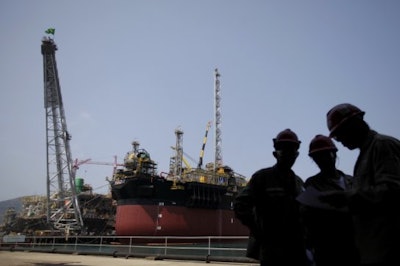
 JACKSON, Miss. (AP) — Warning that it could face as much as $200 million in verdicts for mistreating Indian guest workers, oil rig repairer Signal International of Mobile, Alabama, filed for Chapter 11 bankruptcy protection Sunday.
JACKSON, Miss. (AP) — Warning that it could face as much as $200 million in verdicts for mistreating Indian guest workers, oil rig repairer Signal International of Mobile, Alabama, filed for Chapter 11 bankruptcy protection Sunday.
The company wrote in court papers filed in Delaware that a downturn in oil prices meant that it was repairing fewer oil rigs at its shipyards in Mobile and Pascagoula, Miss.
Signal said that as part of the bankruptcy, it has agreed to settle claims with the guest workers for $20 million to $22 million, the remaining amount due from Signal's $36 million sale of a shipyard in Orange, Texas, last year. Signal also wrote in bankruptcy papers that it would apologize to the workers.
The Retirement Systems of Alabama, a public pension system, has agreed to bid for the company and lend it up to $90 million while in bankruptcy. If no other bidders emerged and the court approved, RSA would own the company, possibly by year's end.
RSA owned 47 percent of the pre-bankruptcy company, and had loaned Signal about $70 million. The company's total current debt is roughly $100 million.
The company said it will keep operating its remaining shipyards, which have about 300 employees. A hearing is scheduled Tuesday in Wilmington, Delaware, for the company, among other things, to seek court permission to keep paying workers and contractors.
Signal hired roughly 500 Indian welders and shipfitters after 2005's Hurricane Katrina, as it landed a rush of repair work from storm-damaged oil rigs. But the workers were lured to Mississippi and Texas with false promises of permanent U.S. residency, paying $10,000 or more to recruiters.
Once they arrived, the guest workers claimed they were told they were going to get 10-month work permits. The suit also accused Signal of housing the workers in squalid conditions and forcing them to pay $1,050 each a month to stay in overcrowded and dirty trailers.
In February, the first five plaintiffs won a $14 million verdict in federal court in New Orleans, with $12.3 million due from Signal. The company said 227 more workers have sued so far.
Court papers show that by March, the company had hired a restructuring officer and was laying plans for the bankruptcy filing.
Private lawyers representing the plaintiffs have agreed to the bankruptcy settlement.
"The folks we represent have waited seven or eight years for justice, and this is hopefully the last step in this process," said Jim Knoepp, deputy legal director of the Southern Poverty Law Center.
The U.S. Equal Employment Opportunity Commission, which filed its own civil suit in 2011, has not agreed.
RSA agreed to enter what's called a stalking-horse bid, which should set a floor for the value of Signal's assets at the amount the company owes the pension fund. It's unclear whether the pension fund intends to operate the shipyard, whose headquarters it lured to Mobile in 2009 by investing in the company.
Leura Garrett Canary, RSA's general counsel, wrote in a statement that RSA believes the bankruptcy process will protect the pension fund's financial interests.
"The conduct giving rise to the plaintiffs' claims against Signal did not occur during RSA's investment in the company, and as an investor and lender in Signal, RSA had no role in the day-to-day operations of the company and did not control the company's management," Canary wrote. "RSA strongly condemns any unfair employment practices and finds labor trafficking abhorrent."





















